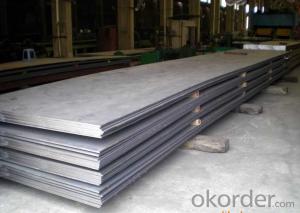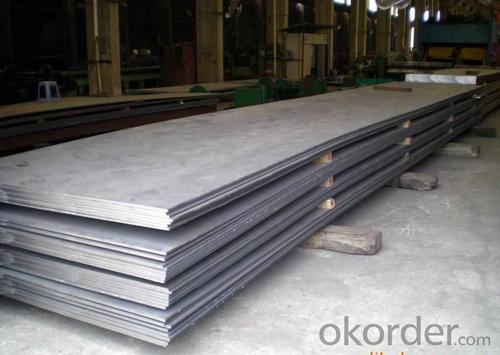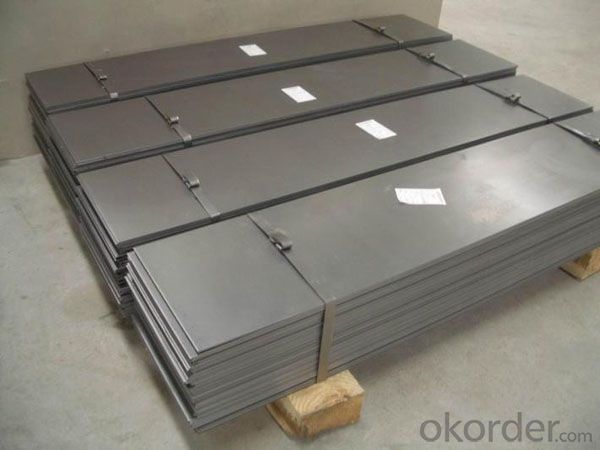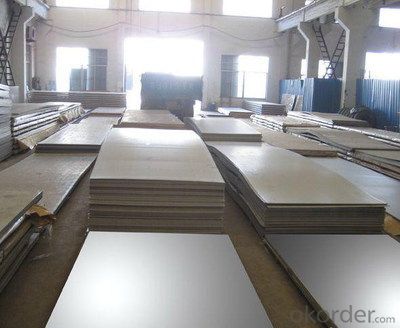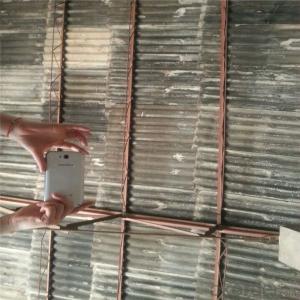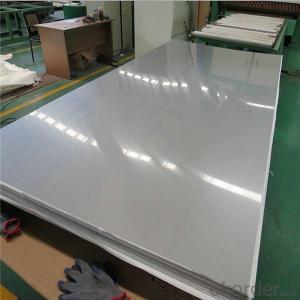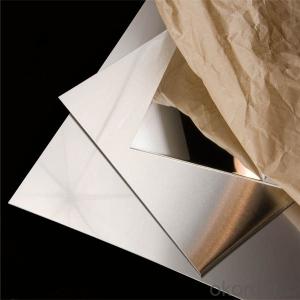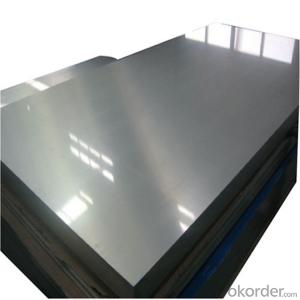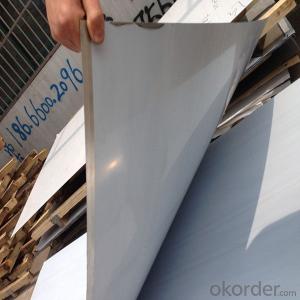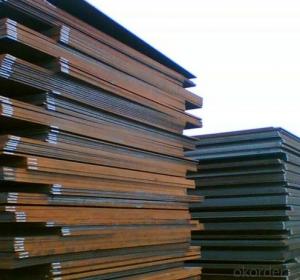2cr13/sus410/1.4021/410 Stainless Steel Plate
- Loading Port:
- China main port
- Payment Terms:
- TT OR LC
- Min Order Qty:
- 25 m.t.
- Supply Capability:
- 10000 m.t./month
OKorder Service Pledge
OKorder Financial Service
You Might Also Like
Specification
Chemical Composition(GB)%
| C | Si | Mn | Cr | P | S |
| 0.16 | ≤0.60 | ≤0.80 | 12.0-14.0 | ≤0.030 | ≤0.030 |
Standard
| GB | ASTM | DIN | JIS |
| 2Cr13 | 410 | 1.4021 | SUS410 |
Available Size
| Rolled plate | 12-120mm*720mm*6000mm | ||
| Module | 130-400mm*1000mm*6000mm | ||
Characterstics
| 1.High corrosion resistance and mirror performance | |||||
| 2.Higher strength and abrasion resistance |
Applications:Suitable for precise dies with super mirror performance and abrasion resistance,camera components,optical lens
Product show:

Workshop show:

FAQ:
1, Your advantages?
professional products inquiry, products knowledge train (for agents), smooth goods delivery, excellent customer solution proposale
2, Test & Certificate?
SGS test is available, customer inspection before shipping is welcome, third party inspection is no problem
3, Payment Terms?
30% TT as deposit and 70% before delivery.
Irrevocable L/C at sight.
4, Trading Terms?
EXW, FOB, CIF, FFR, CNF
5, After-sale Service?
We provides the services and support you need for every step of our cooperation. We're the business partner you can trust.
For any problem, please kindly contact us at any your convenient time.
We'll reply you in our first priority within 24 hours.
- Q: What is the difference between a centerless ground and a rough turned steel round bar?
- A centerless ground steel round bar and a rough turned steel round bar differ in terms of their manufacturing processes and resulting surface finishes. A centerless ground steel round bar is produced by feeding the bar through a grinding machine that removes material from the surface to achieve precise diameter and roundness tolerances. This process involves rotating the bar between two grinding wheels while applying pressure to remove any imperfections and create a smooth, polished surface finish. The end result is a highly accurate and consistent diameter with a mirror-like finish, making it suitable for applications that require tight tolerances and a polished appearance. On the other hand, a rough turned steel round bar is manufactured through a different machining process called turning. This involves rotating the bar against a cutting tool that removes material from the surface in order to achieve the desired diameter and shape. However, unlike centerless grinding, turning does not provide the same level of precision and surface finish. The resulting surface of a rough turned bar will have visible tool marks and a rougher texture compared to a centerless ground bar. In summary, the main difference between a centerless ground steel round bar and a rough turned steel round bar lies in their manufacturing processes and resulting surface finishes. Centerless grinding offers a more precise diameter, roundness, and smoother surface finish, making it ideal for applications that require tight tolerances and a polished appearance. Rough turning, while less precise and with a rougher surface finish, is still suitable for applications that do not require the same level of precision or aesthetic appeal.
- Q: What are the advantages of using magnesium-alloy steel round bars?
- One advantage of using magnesium-alloy steel round bars is their high strength-to-weight ratio. These bars offer excellent strength and durability while being lightweight, making them suitable for applications where weight reduction is crucial, such as in aerospace and automotive industries. Furthermore, magnesium-alloy steel round bars exhibit good corrosion resistance, which extends their lifespan and makes them ideal for outdoor and marine applications. Additionally, these bars can be easily machined and formed, allowing for flexibility in design and fabrication processes.
- Q: Are steel round bars prone to fatigue failure?
- Fatigue failure is a common occurrence in steel round bars, which can be attributed to repeated cyclic loading or stress. This leads to a gradual weakening of the material, eventually causing it to fail, even if the applied stress is below its ultimate strength. Due to their inherent characteristics, steel round bars, like other structural materials, are susceptible to fatigue failure. Various factors can contribute to fatigue failure in steel round bars, including improper design, inadequate material selection, manufacturing defects, and excessive cyclic loading. Additionally, surface defects, notches, stress concentrations, and corrosive environments can further accelerate the fatigue process. Engineers and designers take several measures to mitigate the risk of fatigue failure. These include implementing appropriate design practices, selecting high-quality materials, conducting thorough inspections, applying stress-relieving treatments, and considering the impact of cyclic loading during the structural design phase. It is important to understand that the susceptibility of steel round bars to fatigue failure depends on multiple factors, such as the specific steel grade, loading conditions, environmental factors, and overall structural design. Therefore, it is crucial to carefully assess these factors and employ appropriate mitigation measures to ensure the safe and reliable performance of steel round bars in various applications.
- Q: How do you prevent corrosion on steel round bars?
- One way to prevent corrosion on steel round bars is by applying a protective coating, such as paint or a corrosion-resistant metal coating like zinc or epoxy. Regular maintenance, including cleaning and removing any dirt or moisture buildup, can also help prevent corrosion. Additionally, storing the steel round bars in a dry and controlled environment can minimize exposure to moisture and prevent corrosion.
- Q: What is the maximum length of a steel round bar that can be manufactured?
- The maximum length of a steel round bar that can be manufactured is dependent on several factors, including the diameter or thickness of the bar and the limitations of the manufacturing process. In general, steel round bars can be produced in lengths ranging from a few feet to several hundred feet or even longer. However, it is important to note that as the length of the bar increases, it becomes more challenging to maintain its straightness and dimensional accuracy. This is particularly true for thinner or larger diameter bars, as they are more prone to bending or warping during the manufacturing process. Additionally, logistical constraints such as transportation and handling may also impose limitations on the maximum length of a steel round bar that can be manufactured and delivered efficiently. Therefore, the maximum length of a steel round bar that can be manufactured is not a fixed value, but rather depends on various factors related to the specific requirements, capabilities, and limitations of the manufacturer and the application for which the bar is intended.
- Q: What is the tolerance for length in steel round bars?
- The tolerance for length in steel round bars can vary depending on the specific manufacturing standards and requirements. Generally, the tolerance for length in steel round bars is typically specified in terms of a maximum allowable deviation from the desired or nominal length. This deviation is often expressed as a percentage or as a specific measurement in units such as millimeters or inches. Different international standards organizations, such as the American Society for Testing and Materials (ASTM) or the International Organization for Standardization (ISO), may have their own specific guidelines for the tolerance in steel round bars. These standards help ensure consistent and reliable measurements throughout the industry. In practice, the tolerance for length in steel round bars can range from very tight tolerances of a few millimeters or less, especially for precision applications, to looser tolerances of several centimeters or more for less critical or general-purpose applications. It is important to note that the tolerance for length may also depend on the size and diameter of the steel round bar. Smaller diameter bars may have tighter tolerances compared to larger diameter bars due to the increased difficulty in manufacturing and measuring longer lengths accurately. Ultimately, the specific tolerance for length in steel round bars should be determined based on the intended application and any applicable industry standards or customer specifications.
- Q: How do you calculate the strength of a steel round bar?
- To calculate the strength of a steel round bar, several factors need to be considered. The primary factor is the material's yield strength, which represents the stress level at which the steel begins to deform permanently. This value is typically provided by the manufacturer or can be found in engineering handbooks. Next, the cross-sectional area of the round bar needs to be determined. This can be done by measuring the diameter of the bar and using it to calculate the area using the formula A = πr^2, where A is the cross-sectional area and r is the radius. Once the cross-sectional area is known, the ultimate tensile strength (UTS) can be calculated using the formula UTS = Yield Strength / Safety Factor. The safety factor is a numerical value that accounts for uncertainties and potential variations in the material's strength. It is typically specified by the design requirements or industry standards. Finally, the maximum load that the steel round bar can withstand before failure can be determined by multiplying the ultimate tensile strength by the cross-sectional area. This value represents the strength of the round bar and can be used to assess its suitability for a particular application. It is important to note that other factors such as the bar's length, shape, and any additional treatments or modifications can also affect its strength. Therefore, consulting with a structural engineer or referring to relevant design codes and standards is recommended to ensure accurate calculations and safe application of steel round bars.
- Q: Can steel round bars be machined or forged?
- Yes, steel round bars can be both machined and forged. Machining involves removing material from the round bar to create a desired shape or size, while forging involves shaping the steel through the application of heat and pressure. Both processes are commonly used to manipulate steel round bars for various applications.
- Q: Are steel round bars suitable for marine environments?
- Yes, steel round bars can be suitable for marine environments, but it depends on the specific type of steel used and the conditions of the marine environment. Stainless steel is often the preferred choice for marine applications due to its excellent corrosion resistance properties. Stainless steel contains chromium, which forms a protective layer on the surface of the steel, preventing corrosion and rusting. However, not all steel round bars are suitable for marine environments. Carbon steel, for example, is more susceptible to corrosion in marine environments, especially in the presence of saltwater. Carbon steel should be carefully protected with coatings or treatments to prevent corrosion. Additionally, the conditions of the marine environment also play a significant role in determining the suitability of steel round bars. Factors such as the salinity of the water, exposure to chemicals, temperature variations, and physical stress can affect the corrosion resistance of steel. In highly corrosive marine environments, it is advisable to use specialized marine-grade stainless steel or other corrosion-resistant alloys. Ultimately, it is crucial to select the appropriate grade of steel and consider additional protective measures, such as coatings or galvanization, to enhance the durability and longevity of steel round bars in marine environments.
- Q: Can steel round bars be used in food processing industries?
- Yes, steel round bars can be used in food processing industries. Steel is a popular material choice for various applications in the food industry due to its durability, strength, and corrosion resistance. Steel round bars can be used in food processing equipment such as mixers, conveyors, grinders, and slicers. They can also be used in the fabrication of food storage containers, shelves, and racks. However, it is important to ensure that the steel used in food processing industries is of food-grade quality to meet the necessary hygiene and safety standards.
Send your message to us
2cr13/sus410/1.4021/410 Stainless Steel Plate
- Loading Port:
- China main port
- Payment Terms:
- TT OR LC
- Min Order Qty:
- 25 m.t.
- Supply Capability:
- 10000 m.t./month
OKorder Service Pledge
OKorder Financial Service
Similar products
Hot products
Hot Searches
Related keywords
